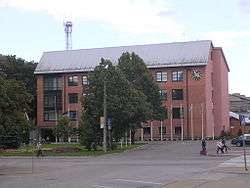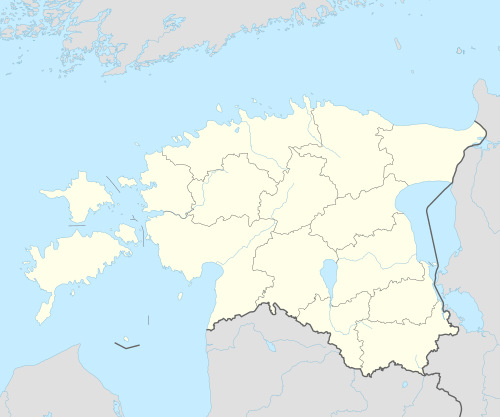Jõgeva
Jõgeva (German: Laisholm) is a small town in Estonia with a population of around 6000 people. It is the capital of Jõgeva County.
Jõgeva | |
|---|---|
 Jõgeva County hall built in 1968 | |
 Flag  Coat of arms | |
 Jõgeva Location in Estonia | |
| Coordinates: 58°44′49″N 26°24′0″E | |
| Country | |
| County | |
| First mentioned | 1599 |
| Borough rights | 13 October 1919 |
| Town rights | 1 May 1938 |
| Government | |
| • Mayor | Raivo Meitus |
| Area | |
| • Total | 3.86 km2 (1.49 sq mi) |
| Population (2017) | |
| • Total | 5,305 |
| • Rank | 26th |
| • Density | 1,400/km2 (3,600/sq mi) |
| Time zone | UTC+2 (EET) |
| • Summer (DST) | UTC+3 (EEST) |
| Area code(s) | (+372) 77 |
| Vehicle registration | J |
| Website | www.jogevavv.ee |
It is known as the coldest place in Estonia with the lowest temperature of −43.5 °C (−46.3 °F). It is the birthplace of Estonian poet Betti Alver.
History
Jõgeva was first mentioned in 1599 as Jagiwa manor, being established only recently on the lands of the same named village by the orders of the Polish king. During the Polish reign in Estonia (1582–1622) it was part of Laiuse starostwo, which became Laiuse fief during Swedish rule (1622–1721).
In 1756, Jõgeva manor became the property of Gotthard Johann von Manteuffel (1690–1763) and remained in the family of von Manteuffel until 1919 when it was nationalized by the government. In 1876, a railway station, named Laisholm after the manor, was established near the village of Jõgeva. The owner of Jõgeva manor, Ernst Gotthard von Manteuffel (1844–1922), started renting out land around the railway station in 1903. After that, the village grew quickly. On October 13, 1919, Jõgeva became a borough and on May 1, 1938 a town.
During the Second World War nearly 60% of the town was destroyed.
During the Soviet occupation of Estonia Jõgeva became an important administrative center with several big industries. Many new administrative, commercial and residential buildings were erected at that time.
Location
Jõgeva is situated on the right shore of Pedja River which flows through the city from north to south. Parallel with the river is the Tallinn–Tartu railway line. The major cities Tartu and Tallinn are respectively 51 and 154 kilometres (96 miles) from Jõgeva, both connected through railway as well as through highways.
Nature and climate
Jõgeva is located between big drumlins. The hill of Laiuse is located east from the town. River Pedja passes through the town. The town has Humid continental climate(Dfb). Winters are usually snowy and cold. Summers are warm and often humid, some days the maximum can reach 30- 35C. Thunder season starts in April and ends usually in the end of October.
| Climate data for Jõgeva (1981–2010) | |||||||||||||
|---|---|---|---|---|---|---|---|---|---|---|---|---|---|
| Month | Jan | Feb | Mar | Apr | May | Jun | Jul | Aug | Sep | Oct | Nov | Dec | Year |
| Record high °C (°F) | 9.6 (49.3) |
10.0 (50.0) |
17.2 (63.0) |
27.1 (80.8) |
29.7 (85.5) |
30.6 (87.1) |
33.4 (92.1) |
34.6 (94.3) |
29.6 (85.3) |
20.8 (69.4) |
11.7 (53.1) |
11.2 (52.2) |
34.6 (94.3) |
| Average high °C (°F) | −2.4 (27.7) |
−2.5 (27.5) |
2.3 (36.1) |
10.1 (50.2) |
16.7 (62.1) |
19.9 (67.8) |
22.6 (72.7) |
21.0 (69.8) |
15.2 (59.4) |
8.9 (48.0) |
2.3 (36.1) |
−1.2 (29.8) |
9.4 (48.9) |
| Daily mean °C (°F) | −4.9 (23.2) |
−5.8 (21.6) |
−1.7 (28.9) |
4.9 (40.8) |
10.9 (51.6) |
14.7 (58.5) |
17.2 (63.0) |
15.6 (60.1) |
10.6 (51.1) |
5.7 (42.3) |
0.1 (32.2) |
−3.5 (25.7) |
5.3 (41.5) |
| Average low °C (°F) | −8 (18) |
−9.4 (15.1) |
−5.6 (21.9) |
0.4 (32.7) |
4.9 (40.8) |
9.0 (48.2) |
11.2 (52.2) |
10.6 (51.1) |
6.4 (43.5) |
2.7 (36.9) |
−2.2 (28.0) |
−6.3 (20.7) |
1.1 (34.0) |
| Record low °C (°F) | −36.7 (−34.1) |
−35.4 (−31.7) |
−29.5 (−21.1) |
−13 (9) |
−6.6 (20.1) |
−2 (28) |
0.5 (32.9) |
0.2 (32.4) |
−8.4 (16.9) |
−15.7 (3.7) |
−25 (−13) |
−29.2 (−20.6) |
−36.7 (−34.1) |
| Average precipitation mm (inches) | 50 (2.0) |
36 (1.4) |
38 (1.5) |
30 (1.2) |
49 (1.9) |
79 (3.1) |
76 (3.0) |
93 (3.7) |
60 (2.4) |
71 (2.8) |
56 (2.2) |
50 (2.0) |
688 (27.1) |
| Average relative humidity (%) | 89 | 86 | 81 | 73 | 68 | 74 | 76 | 80 | 85 | 88 | 90 | 90 | 82 |
| Mean monthly sunshine hours | 31.2 | 61.0 | 124.0 | 177.0 | 268.0 | 276.6 | 276.1 | 227.7 | 140.2 | 81.8 | 29.8 | 17.9 | 1,711.4 |
| Source: Estonian Weather Service (sun, 1971–2000)[1][2][3][4] | |||||||||||||
Culture
In July Jõgevatreff, an annual bikers reunion takes place. The culmination of the event is the parade of the bikers through the town. In August, the annual Garlic Festival is held. Jõgeva is also regarded as the headquarters of the Estonian Santa Claus.
Sights and buildings
- The house museum of Estonian poet Betti Alver - the house by the railway station where she was born;
- Külmasammas - a monument marking the Estonian cold record of −43.5 °C (−46 °F) recorded in Jõgeva in 1940;
- The Estonian War of Independence memorial stone to commemorate the casualties;
- The memorial to the casualties of the Second World War;
- The memorial to the Estonian deportees during Soviet occupation in 1941 and 1949;
International relations
Gallery
- Fire station and rescue building
 Jõgeva department store from Soviet era
Jõgeva department store from Soviet era Jõgeva railway station
Jõgeva railway station Building in Jõgeva from 1938
Building in Jõgeva from 1938 Residential buildings from Soviet era
Residential buildings from Soviet era Old railway station
Old railway station- Bus station
 Water tower
Water tower- Betti Alver museum
- Cultural center
See also
References
- Notes
- "Climate normals-Temperature". Estonian Weather Service. Retrieved 27 September 2016.
- "Climate normals-Precipitation". Estonian Weather Service. Retrieved 27 September 2016.
- "Climate normals-Humidity". Estonian Weather Service. Retrieved 27 September 2016.
- "Kliimanormid-Päikesepaiste kestus" (in Estonian). Estonian Weather Service. Archived from the original on 22 February 2012. Retrieved 27 September 2016.CS1 maint: BOT: original-url status unknown (link)
- "Välissuhted" (in Estonian). Jõgeva linn. Retrieved 2011-07-23.
External links
| Wikimedia Commons has media related to Jõgeva. |